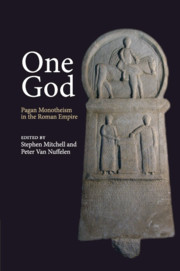Book contents
- Frontmatter
- Contents
- Preface and acknowledgements
- List of abbreviations
- 1 Introduction: the debate about pagan monotheism
- 2 Pagan monotheism as a religious phenomenon
- 3 Pagan ritual and monotheism
- 4 The case for pagan monotheism in Greek and Graeco-Roman antiquity
- 5 Monotheism between cult and politics: the themes of the ancient debate between pagan and Christian monotheism
- 6 The price of monotheism: some new observations on a current debate about late antiquity
- 7 Megatheism: the search for the almighty god and the competition of cults
- 8 Deus deum … summorum maximus (Apuleius): ritual expressions of distinction in the divine world in the imperial period
- 9 Further thoughts on the cult of Theos Hypsistos
- Bibliography
- General index
- Index of authors, works and citations
Preface and acknowledgements
Published online by Cambridge University Press: 20 May 2010
- Frontmatter
- Contents
- Preface and acknowledgements
- List of abbreviations
- 1 Introduction: the debate about pagan monotheism
- 2 Pagan monotheism as a religious phenomenon
- 3 Pagan ritual and monotheism
- 4 The case for pagan monotheism in Greek and Graeco-Roman antiquity
- 5 Monotheism between cult and politics: the themes of the ancient debate between pagan and Christian monotheism
- 6 The price of monotheism: some new observations on a current debate about late antiquity
- 7 Megatheism: the search for the almighty god and the competition of cults
- 8 Deus deum … summorum maximus (Apuleius): ritual expressions of distinction in the divine world in the imperial period
- 9 Further thoughts on the cult of Theos Hypsistos
- Bibliography
- General index
- Index of authors, works and citations
Summary
This volume has its origins in a research project on the intellectual background to pagan monotheism, financed by the Arts and Humanities Research Council, and directed at the University of Exeter by Stephen Mitchell from 2004 to 2007. The funding provided for a post-doctoral research fellowship, taken by Dr Peter Van Nuffelen, and a PhD studentship, awarded to Anna Collar. Within the framework of the project they have respectively completed a monograph on philosophy and religion in the Roman Empire, from the first century bc to the second century ad, provisionally entitled ‘Philosophical readings of religion in the post-Hellenistic period’, which has focused on the evidence of major writers from Varro to Numenius, and a thesis on networks and the diffusion of religious innovation in the Roman Empire, based on a theorised approach to the documentary evidence for three forms of worship, the cult of Iuppiter Dolichenus, Diaspora Judaism, and the cult of Theos Hypsistos. As a focal point, we organised an international conference on pagan monotheism in the Roman world, held at Exeter in July 2006, which included more than thirty papers. These have formed the basis for two publications, a collection of essays entitled Monotheism between Christians and Pagans in Late Antiquity, edited by Stephen Mitchell and Peter Van Nuffelen and published by Peeters, Leuven (2009), and the present volume.
- Type
- Chapter
- Information
- One GodPagan Monotheism in the Roman Empire, pp. vii - viiiPublisher: Cambridge University PressPrint publication year: 2010



